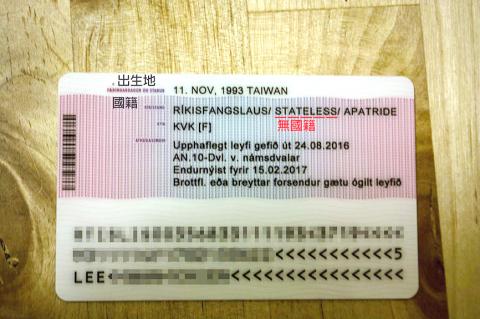A Taiwanese exchange student in Iceland yesterday reported that the nationality on her residency permit had been changed to “stateless” after she appealed against being classified as “Chinese.”
“Even though I’m only on a half-year exchange, having ‘Chinese’ written on my ID card made me uncomfortable, because I identify with Taiwan as my country of citizenship,” a female student studying at the Reykjavik University, identified only by her surname Lee (李), wrote on “台灣人在歐洲 Taiwanese in Europe” Facebook group.
The 23-year-old School of Law student said she carried her passport to avoid using the permit.

Photo provided by Lee
A series of e-mails to Iceland’s immigration agency explaining the difference between Taiwan (Republic of China) and China (People’s Republic of China) elicited no reply, she said, adding that she only started to receive responses after she brought up the issue when she applied in person for a work permit.
“The woman at the window looked at me apologetically and said she was surprised that there would be this kind of problem, but her supervisor had said that because Taiwan was not a recognized country, there was nothing he could do,” Lee said.
However, after three months of contacting different government bureaus and the Taipei Representative Office in Denmark, she finally received a new ID card, which listed her nationality as “stateless.”
“At that moment, I wasn’t sure whether to be happy or cry,” Lee said, adding that her place of birth on the card was changed from “Kaohsiung” to “Taiwan.”
“This probably barely counts as half of a success, because ‘stateless’ at least shows that they acknowledge my statement that Taiwan isn’t Chinese territory,” she said.
Lee said her experience should be a warning about the nation’s weakening international status, adding that she was tired of having to apologize for not being “Chinese.”
“Why do I always have to say sorry?” she said.
“I’m not sorry that I’m not Chinese and I would like to never see any Taiwanese apologizing for being Taiwanese ever again,” she said.
“While Taiwan may think of itself as a normally operating country, as soon as we go abroad, who pays attention to us? No one recognizes us, our overseas representatives don’t have the standing to speak up, and no one listens,” she said.
“People who have not gone abroad don’t have to face this and might not realize the importance of the nation’s official name, and the reality that we’re becoming more and more disadvantaged internationally. Dragging out the ‘maintenance of the status quo isn’t really a good thing,” Lee wrote.
The Ministry of Foreign Affairs said that as the nation does not have a representative office in Iceland, all affairs there are handled by the Taipei Representative Office in Denmark, which has been instructed to offer assistance to the student.
Additional reporting by staff writer

PREPAREDNESS: Given the difficulty of importing ammunition during wartime, the Ministry of National Defense said it would prioritize ‘coproduction’ partnerships A newly formed unit of the Marine Corps tasked with land-based security operations has recently replaced its aging, domestically produced rifles with more advanced, US-made M4A1 rifles, a source said yesterday. The unnamed source familiar with the matter said the First Security Battalion of the Marine Corps’ Air Defense and Base Guard Group has replaced its older T65K2 rifles, which have been in service since the late 1980s, with the newly received M4A1s. The source did not say exactly when the upgrade took place or how many M4A1s were issued to the battalion. The confirmation came after Chinese-language media reported

The Taiwanese passport ranked 33rd in a global listing of passports by convenience this month, rising three places from last month’s ranking, but matching its position in January last year. The Henley Passport Index, an international ranking of passports by the number of designations its holder can travel to without a visa, showed that the Taiwan passport enables holders to travel to 139 countries and territories without a visa. Singapore’s passport was ranked the most powerful with visa-free access to 192 destinations out of 227, according to the index published on Tuesday by UK-based migration investment consultancy firm Henley and Partners. Japan’s and

A Ministry of Foreign Affairs official yesterday said that a delegation that visited China for an APEC meeting did not receive any kind of treatment that downgraded Taiwan’s sovereignty. Department of International Organizations Director-General Jonathan Sun (孫儉元) said that he and a group of ministry officials visited Shenzhen, China, to attend the APEC Informal Senior Officials’ Meeting last month. The trip went “smoothly and safely” for all Taiwanese delegates, as the Chinese side arranged the trip in accordance with long-standing practices, Sun said at the ministry’s weekly briefing. The Taiwanese group did not encounter any political suppression, he said. Sun made the remarks when

BROAD AGREEMENT: The two are nearing a trade deal to reduce Taiwan’s tariff to 15% and a commitment for TSMC to build five more fabs, a ‘New York Times’ report said Taiwan and the US have reached a broad consensus on a trade deal, the Executive Yuan’s Office of Trade Negotiations said yesterday, after a report said that Washington is set to reduce Taiwan’s tariff rate to 15 percent. The New York Times on Monday reported that the two nations are nearing a trade deal to reduce Taiwan’s tariff rate to 15 percent and commit Taiwan Semiconductor Manufacturing Co (TSMC, 台積電) to building at least five more facilities in the US. “The agreement, which has been under negotiation for months, is being legally scrubbed and could be announced this month,” the paper said,